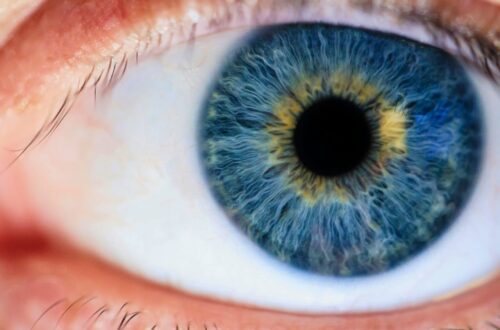In the Iliad, the gods and goddesses play a cabalistic role in the entire war. In Greek mythology, there are twelve gods and goddesses, some of them are on the Trojan side and some of them are on the Greek side. Zeus is the principal god dominating over the war. Apollo, Artemis, Ares, Aphrodite are on the Trojan side and Hera, Athena, Poseidon, Harmes Hephaestus are on the Greek side. Homer portrayed gods and goddesses in various manners. They may seem as comical characters in the mount Olympus but bold and powerful on the earth. They have been portrayed as disguisers, sometimes as life savers and sometimes quarrelsome trouble makers. Wallace Anderson detects that Homer’s gods in The Iliad are really “anthropomorphic” as they “exhibit feelings and traits which are decidedly human”. In a word, one of the notable features of gods and goddesses in that book is that they have been humanized by Homer in various ways.
Zeus:
Zeus is the chief god among the twelve Greek gods. He is the youngest child of Cronus and Rhea who is the sky god and also God of thunder and lightning. He is the brother of Poseidon who is the sea god and Hades who is the god of the dead. Hera is his sister and wife. He has many children with many other ladies Zeus likes to cheat Hera over and over again and make love with other women. However, Zeus is the final authority and he is like the king of mount Olympus. In the Trojan war, he mainly supports the Greeks. Zeus promises Thetis that he will give glory to her son Achilles and for implementing this plan, he temporarily helps the Trojan warrior to become successful.
However, in Zeus’s character, we can find some human-like qualities. At one stage Zeus is outmaneuvered by Hera, that means he is seduced by Hera like a human being and falls asleep after making love with her. In addition, in mount Olympus Zeus acts as a “mayor” who is the final authority and rules the other gods and takes the final decision solely. When gods and goddesses fight against each other, Zeus laughs at them which is a human trait.
Athena:
Athena is the goddess of wisdom, craft who reflects strategy and tactics in the war. She is related to owls as she is a source of rationality and wisdom and also related to snakes as she is crafty enough. She is the most involved goddess in the war who helps the Greek heroes in various ways numerous times without any ethical barriers. She used to help the one she loved but did not think twice to harm her opponent. She is the daughter of Zeus and Metis. The ox-eyed Athena favors the Greeks always. When Achilles goes forward to kill Agamemnon at the first part of The Iliad, Athena comes down and makes Achilles calm down and promises him greater glory. Moreover, she appears in Achilles’s dream and forbids him to join the Greek army. Athena is like a true mentor and guidance of Achilles. Achilles falls in trouble while fighting with the river Xantus because he fights it without any rationality and without Athena’s guidelines. Her biggest trick is that she disguised herself as Deiphobus to deceive Hector just before his being killed by Achilles. After the first duel between Paris and Menelaus, Menelaus is announced as the winner and the Trojan war is about to end. But the interruption of Athena and Hera revives it again. Athena disguises herself as a common soldier and convinces Pandarus, the Trojan fool, to attack Menelaus. When he attacks Menelaus, Athena plays a double-role. She goes near Menelaus to take control over the arrow so that the arrow may not kill Menelaus but wound him slightly. For her trick, the war is revived again. Thus, her tricks and interference always increase the complexity of the situation and make the war duration longer. Athena helps Diomedes, the Greek hero, various times by putting courage and fearlessness in his mind. When Diomedes is wounded, Athena comes to heal his wound and removes the curtain from his eyes which prevents human beings from seeing the gods. She does this so that Diomedes can understand whether gods are helping his opponents or not. In addition, Athena plans the second duel with Apollo between Hector and Ajax.
Poseidon:
Poseidon is son of Cronus and Rhea who is the god of the sea. He is also the god of storms and earthquakes. He supports Greeks in the Trojan war. He is the brother of Hera, Zeus and Hades. Poseidon is known as “the lord of the Earth”. When the Greeks build the Achaean walls, they forget to offer Poseidon Hecatomb. This makes Poseidon jealous. When Zeus prohibits interrupting the Gods in human affairs for some time, Poseidon disguises himself as a soothsayer and helps the greater Ajax. He also rescues Aeneas who was on the Trojan side from Achilles though he is helping the Greeks because Aeneas’s fate allows him to live longer.
Apollo:
Apollo is the god of sun, music and archery. He is the son of Zeus and Leto and twin brother of goddess Artemis. Apollo is on the Trojan side in the Trojan war. He is the first god in The Iliad who interferes in the Trojan war by spreading plague disease among the Greek soldiers. Apollo actually becomes very angry when Agamemnon refuses to give back Chryseis to her father, the priest of Apollo. Apollo and Athene plan a duel between Hector and Ajax. Also Apollo strengthens Hector several times. He helps Hector to revive his energy and fight in a more ferocious manner. Moreover, The Phoebus Apollo warns Patroclus to retreat three times but when Patroclus does not listen to him, he helps Hector to kill Patroclus. Apollo is called “Phoebus” by Homer because it means bright which upholds his role as a god of light and sun. Apollo also helps Hector, the Trojan prince at his last fight with Achilles but at last, Hector is killed by the Greek Hero Achilles.
Ares:
Ares is the god of war and courage and is the son of Zeus and Hera. He usually likes war and conflict, the destructive side of human affairs. He is the one who throws a golden apple in the banquet hall of marriage between Thetis and Peleus. As he was not invited to that party, he wanted to destroy it. Ares supports the Trojan in the war. So, when he helps Hector Hera and Athena go near Zeus to complain about Ares that he is helping Hector without any moral barrier and here they act like they are firm believers of justice and righteousness. Ares is beaten by Diomedes also. Then he goes near Zeus to complain about it which makes Zeus laugh at him. Thus, it is a kind of humanization process where gods are portrayed with human qualities and features. This is the anthropomorphic feature of gods.
Hades:
Hades is the eldest son of Cronus and Rhea and the brother of Zeus, Poseidon and Hera. He is the god of the underworld, that means, he is the god of the dead. He takes neither side in the Trojan war.
Artemis:
Artemis is the daughter of Zeus and Leto and is the twin sister of Apollo. She is the goddess of wild animals and chastity. Artemis takes the Trojan side in the war. When the gods and goddesses start fighting with each other, Hera fights against Artemis and wounds her. Like other Gods, Artemis also goes near Zeus to complain against her, which also makes Zeus laugh at her.
Hephaestus:
Hephaestus is the god of blacksmiths, carpenters and sculptures. He is the son of Hera. He was born lame that is why Hera throws him from the mount Olympus to hide this shame and by chance, Achilles’s mother Thetis saves his life. Hephaestus is the peacemaker among the Gods who never quarrels rather always tries to solve problems between others. However, he supports Greeks in the Trojan war. Athena gives Diomedes a sword made by Hephaestus. Moreover, he makes a bold gorgeous shield for Achilles at the request of his mother Thetis. Patroclus wears Achilles’s shield and joins the Trojan war but according to the plan of Zeus, Patroclus is killed by Hector. So, Hector puts on Achilles’s armor on his body. So, Hephaestus makes a shield, breastplate and helmet in Achilles studded with decorative and elaborate imagery and symbols.
Thetis:
Thetis is a sea nymph who is the mother of Achilles and is married to Peleus. In The Iliad she loves her mortal son Achilles dearly and does not want to lose him. When Agamemnon insults Achilles, Thetis comes near his son and after hearing everything she goes near Zeus to make him promise that he will help his son to win glory. Thetis tells Zeus to make the Trojan win the war so that Agamemnon can understand his mistake and comes near Achilles to request him to join the war again. So out of Thetis’s request, Zeus plans all the things. If we observe deeply, we can see that As Thetis is immortal and a goddess of water, she knows exactly what will happen in future. She knows Achilles will die one day and will die immediately after Hector’s death. This worry even worsens her situation. She always tries to save her mortal son from misery. Another fact is that a mortal mother’s sorrow will be finished as soon as she dies. But as she will live forever, her sorrow will never end, rather her sufferings will be eternal. Thetis can not stand seeing Achilles crying madly just after the death of Patroclus and she weeps. Immediately she goes near Hephaestus and requests him to make a shield and armor for his son. After learning the fact that Achilles is going to take revenge by killing Hector, she warns Achilles in a grief-stricken heart that he will die just after the death of Hector.
Aphrodite:
Aphrodite is the goddess of physical love, fertility and beauty. According to Homer, she is the daughter of Zeus and Dione. Aphrodite gives Paris Helen, the wife of Menelaus, as his promised gift and her this interruption actually is the main reason why the Trojan war has been started. Aphrodite helps the Trojan in many ways. When the first duel between Menelaus and Paris is held and Paris is about to lose it, here intervenes Aphrodite. She hides Paris in dense mist and takes him away from Menelaus’ hand in his own fragmented bedroom near Helen to make love with her. The trojan war would have ended there if Aphrodite had not interrupted at that time. Another interesting event happens in The Iliad where Aphrodite has been portrayed as a slightly comical character. In the war Diomedes was about to kill Aphrodite’s son Aeneas who was fighting for the Trojans. At that time, Aphrodite comes to save his son and Diomedes beats Aphrodite in a cruel manner and wounds her hand. She goes near Zeus to complain about it and also goes near her mother Dione by crying. Then her mother consoles her like a mortal mother and cures her wound. This is humanization of goddess as we can see, they can be wounded like human beings and complains and cry to express their sorrow to their dear ones like mortal human.





